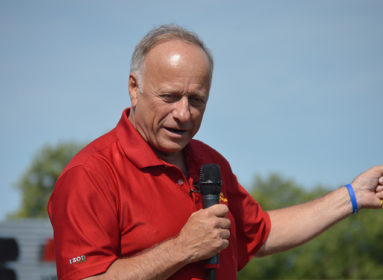Israel Hayom / exclusive to JNS.org ~
Israel urged the visiting Russian president on Monday, June 18 to step up pressure on Iran to curb its suspect nuclear program, but there was no sign of any concessions from Vladimir Putin. With Russia an influential voice in the international debate over Iran, the outcome of the 24-hour visit could have deep implications for whether Israel decides to strike Tehran’s nuclear facilities or give the international community more time to find a diplomatic solution to the standoff.
Israel and Russia enjoy deep economic and cultural relations bolstered by the more than one million immigrants from the former Soviet Union who now live in the Jewish state. But they have deeply differing approaches to Iran’s nuclear program and the uprising in Tehran’s close ally Syria. Russia has blocked drastic action against the two countries, while Israel has repeatedly hinted it may act militarily to stop Iran’s nuclear program.
Russian President Vladimir Putin arrived in Israel on Monday for his first official visit to the country since 2005. The purpose of the visit was to promote Russian-Israeli relations on economic, cultural and religious matters.
In a brief statement after meeting with Israeli Prime Minister Benjamin Netanyahu, Putin said their talks covered the situation in Iran and the bloody uprising in Syria, but added that he saw negotiations as the only solution for such matters.
Netanyahu countered with far more detail. “We agree that nuclear weapons in the hands of Iran pose a grave danger, first for Israel but also for the region and the whole world,” he said. Netanyahu insisted that all uranium enrichment in Iran must cease and its underground nuclear facility near Qom be dismantled. He added that “the killing and horrible suffering of the Syrian people” must be stopped.
Putin had reiterated that he had no obligations towards Syrian President Bashar al-Assad but emphasized the connection to the Syrian people.
Iran is under four sets of Security Council sanctions because of its nuclear program. Israel has welcomed these but warned they are not enough. Efforts aimed at tougher UN sanctions have been opposed in the Security Council by Russia and China, both permanent veto-wielding members that have extensive financial interests in Iran. Russia, for instance, has built a $1 billion nuclear reactor in Bushehr. But Moscow, bowing to U.S. and Israeli demands, has also scrapped a deal to sell Iran long-range missiles that could provide a powerful deterrent against a potential air attack. Russia and China have joined world powers in a new set of low-level negotiations with Iran in July, after the last round yielded no breakthroughs.
Russia has continued its arms sales to Damascus throughout the violent popular uprising against Assad. Israel is afraid Russian weapons in Syria will fall into the hands of allied Hezbollah militants in neighboring Lebanon, something Israel says happened during its 2006 war with the Lebanese group.
Putin began his official visit at a ceremony to inaugurate a Soviet Red Army memorial in the coastal city of Netanya, paying tribute to fallen soldiers of World War II that included tens of thousands of Jews.
“The memory of the fallen is sacred in my eyes. I am moved that you feel the same thing in Israel,” he said, facing the sculpture of a massive pair of wings on a wind-swept hilltop overlooking the Mediterranean Sea.
President Shimon Peres linked the past to the challenges of the present. “I am confident that Russia, which defeated fascism, will not allow similar threats today. Not the Iranian threat. And not the bloodshed in Syria,” he said at the ceremony.
At a state dinner later Monday, Peres pressed Putin further. “I ask of you again: Raise your voice against a nuclear Iran, against destroying a people. You know well the depth of sensitivity of the Jewish people when we are threatened with destruction,” he said.
Putin, however, warned against a possible attack on Iran. “We should think before we do things we later regret. … Look what happened to the U.S. in Afghanistan and Iraq. I told this to [U.S.] President Obama as well. It’s important not to jump the gun,” Putin said.
Putin responded that Russia has a “national interest” to secure peace and quiet in Israel but did not elaborate further.
The trip was Putin’s second in Israel, having last visited seven years ago. On Tuesday, he heads to the West Bank and Jordan. The Russian leader came with an entourage of hundreds of officials and businesspeople, who will be exploring possible military, technology and energy deals between the two countries.
Putin said his visit stressed not only the friendly relations between the countries but also a “solid basis on which to build dialogue and partnership.” He said he spoke with Netanyahu about cooperation in science, technology, agriculture, medicine and culture.
“I have been very impressed by the things I have seen, and [this trip] strengthened the sense of pride I have for the Jewish people and the State of Israel,” Putin said. “Russia had an important role in defeating the Nazis, and the nation that went through the Holocaust remembers its executioners and its liberators.”







 Southern New England Jewish Ledger
Southern New England Jewish Ledger












